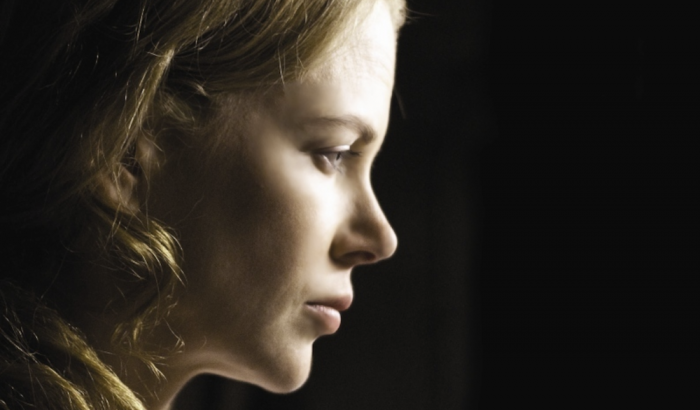“Death is indeed a fearful piece of brutality; there is no sense pretending otherwise. It is brutal not only as a physical event, but far more so psychically: a human being is torn away from us, and what remains is the icy stillness of death. There no longer exists any hope of a relationship, for all the bridges have been smashed at one blow.” ~ Carl Jung
~
I’m at a dinner party with friends when I begin an engaging conversation with a woman I haven’t met before.
Music plays softly in the background as our conversation touches on many different topics. She begins to tell me about a difficult situation she recently faced and how her sister supported her through it.
I listen intently while she gushes about how lucky she is.
“Life just wouldn’t be the same if I didn’t have her,” she looks at me and smiles. I take a sip of my red wine, her words piercing my heart.
There’s a silence, and I wonder if now would be a good time to tell her that I too have a sister. But instead, I gently change the subject.
Often, we never know what emotional wound we’ve reopened in others. How could we? The cuts and bruises of our own psyche are concealed so well behind earnest smiles and fake laughs. It makes me wonder how often I accidentally hurt others by bringing up the very thing they are trying to move on from.
This particular conversation happens to come in October, when my heart prepares for another anniversary of my sister’s death. Each year when this date comes around, I feel compelled to commemorate it in some sort of grand, meaningful way. But I struggle to think of anything that could ever be enough.
Unfortunately, the comforting sentiment “time heals all wounds” doesn’t really apply when it comes to grief. At least not for me, or my parents. Together, we live in a world that still contains my sister, while the rest of the world seems to forget.
It’s not that we are stuck in a permanent state of agony, we’ve just learned to adjust. I suppose the parallel could be like the adjustment to losing a limb. No matter how much time passes, you will always remember what it felt like to run and jump and play, and how you can’t do that anymore. Some days you might be particularly sad about it; other days, it’s a bit more manageable.
It seems like a human tendency to crave simplicity and a linear, systematic approach to grief. The infamous Elisabeth Kübler-Ross stages of grief—denial, anger, bargaining, depression, and acceptance—have been widely misunderstood in assuming that grief passes in chronological order. But anyone who has experienced it knows that it’s a tangled up mess that slides backward and forward.
Particularly on anniversaries.
Everything about the time of year when the person we loved died can trigger us. It’s that familiar smell in the air, the change of seasons, a song on the radio—and in an instant, we are back to the day when we found out. It reawakens the shock we experienced all over again.
The mind always wants a quick fix to move on, but the heart will never forget. So we tell ourselves that we’re fine, everything is fine. Meanwhile, our body surges with depression, guilt, loneliness, anxiety, irritability, anger, as well as physical symptoms from sleeplessness, unusual dreams, headaches, lack of appetite, difficulty concentrating, or an increase in distressing memories.
So, what do we do?
It’s been six years since my sister died, and I’m still stunned by how powerful a force grief can be. No matter how fine I might think I feel, the pain of loss is still locked inside my body and I can’t quite find the keys to let it out.
I’ve yet to find something that brings peace and connection to my sister. In the past, I’ve tried to force the day by hurrying it along, only to find out that this never works. I’m now attempting to lean into the grief to truly understand it so that one day I can work in bereavement and help others.
Here are some ideas that could help:
Do something your loved one liked to do.
My sister loved many things—animals, hiking, traveling, nature, and, most of all, art. She was an incredibly talented artist. She would often spend hours drawing, painting, or collaging.
I’m currently studying Transpersonal Art Therapy, and, while doing a collaging exercise in class, I felt this surging connection to my sister. After about 30 minutes, the teacher told us it was time to break for lunch, but I couldn’t stop. While the others left, I carried on as if I was in a trance. I felt so connected to my sister that it just about brought tears to my eyes.
Create a physical reminder.
When someone we love dies, it’s only in our minds or in our dreams where we can visit them. Having something physical that you can see can be healing.
You could plant a tree in their honor. Watching the tree grow over the years allows for a physical reminder of them. Or you could plant flowers (or buy them if you aren’t into gardening) and create your own beautiful bouquet for your eyes to enjoy as a symbolic reminder of the transience of all beings. Flowers, like us, are only here for a short time. Remembering that could help us to accept mortality and enjoy the time we have while we are alive.
Another idea could be to plant a veggie garden. Every moment would be a chance to connect to the loved one, and, once the garden is in full bloom, ripe with delicious vegetables, a meal can be enjoyed and you can give thanks to them for “helping” in their own supernatural way.
Write a letter.
Often people say they can’t write—but everyone can. It’s just the same reaction as handing someone a paintbrush and them saying, “Oh, no, I can’t paint.” Adults tend to hide behind “can’t” or “not good at,” because we were told once that we weren’t good at it.
But it’s not about being good at anything. It’s about healing your heart.
A lot of pain from loss is around all the things we want to talk about and all the things that the person we love is missing out on. A friend of mine once said that she has continued to have conversations with her dad who died. It’s helped her immensely to talk with him in her own imaginary way, finding guidance on issues he always helped her with.
So whether you talk out loud or want to keep it a letter is completely up to you. Either way, it gives you a chance to release all the things you wanted to say.
If the thought of it makes you feel uncomfortable, bring it up with your counselor and they will develop a plan that works for you.
Set aside alone time.
If you need to, take the day off. If you think, “Ah, I can’t do that…” then let me ask if you would go into work when you had the flu. Hopefully, the answer would be no.
Grief is similar to the flu, but instead of being a contagious respiratory illness, it’s a pain erupting from the heart and soul. Both need some inner tender loving care. Respect your body, respect your healing, and take some time for yourself.
Accept the sheer power of grief.
Many people mistakenly believe that grief is a single emotion. In actuality, it’s a powerful response that shakes us emotionally, physically, mentally, and spiritually. It is a natural and normal process that all human beings must face when dealing with loss.
As much as we may think we can outsmart it by ignoring or pushing it down, it will always find other ways to seep through.
Accepting these raw and powerful feelings to flow through your body can be unbelievably painful. I sometimes think of it as an emotional storm. When nature breaks down in a thunderous rage with bolts of lightning, we all flee undercover. In these moments, I respect nature’s honest and vulnerable display of despair and pain. For me, it’s a reminder that we are all like nature; we all experience inner hurricanes, floods, and earthquakes.
No matter how extreme, they always pass. But we need to get out of the way and allow it through.
Move forward.
No matter what happens to us in life, it moves on. We can be left with the most earth-shattering anguish and still find that the sun will rise for a new day. I know very well how unbelievably painful it can be to see the world carry on as you are left gasping for air.
We all walk our own unique paths on the road to healing. No matter how much time has passed, our loved ones will always remain inside our hearts.
They are the guiding lights that keep us moving forward, and I can’t think of a better way to pay tribute to those we loved and lost than to fill the world with even more compassion and gentle kindness.


 Share on bsky
Share on bsky





Read 2 comments and reply